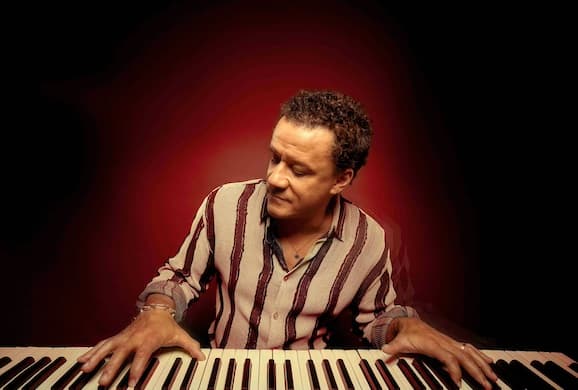With ‘Moving On,’ Jacky Terrasson Plays Among the Jazz Pianist Pantheon
The French-born, American-schooled musician’s new album is abundant with highly confident references — Easter Eggs, even — to great jazz pianists past and present.

Jacky Terrasson
‘Moving On’
Earth Sounds
It takes a very secure artist to deliberately invite comparison with other artists in the same field of endeavor, especially if those other artists happen to be enduring icons. A French-born, American-schooled pianist, Jacky Terrasson, has just released a new album titled “Moving On,” and it is abundant with highly confident references — Easter Eggs, even — to great jazz pianists past and present.
At Smoke, where he launched the album a few weeks ago, Mr. Terrasson began with an original titled “The Call,” an overt homage to the late Ahmad Jamal — it was telegraphed by the percussion patterns of drummer Alvester Garnett even before Mr. Terrason began playing.
The combination of a drumstick in one hand and a mallet in the other was a signature device of Jamal and his drummer Vernel Fournier; “The Call” is essentially a Jacky T original reclining on top of an underlying Jamal-Fournier-style beat. He throws in other things on top of that beat, including a generous sample of John Lewis’s “Golden Striker” and Charlie Parker’s blues “Au Privave.”
Likewise, both the album and the Smoke set reached a high point with “Misty,” though this highly understated reading references Frédéric Chopin as much as it does Erroll Garner, especially during the live set. In fact, it was almost more space-ey than misty, featuring an eloquent solo by bassist Kenny Davis.
Mr. Terrasson’s American trio, with Messrs. Garnett and Davis, appeared at Smoke and also on sections of “Moving On,” and the pianist’s French trio, with bassist Sylvain Romano and drummer Lukmil Perez, also appears throughout the album. Further, the new release gives us an ambitious array of guest stars, including, surprisingly, a pair of female singers, Camille Bertault and Kareen Guiock Thuram. Ms. Bertault’s soprano gets interwoven into the ensemble in “Est-ce que tu me suis?” (“Are you following me?”), in which her voice and her own words become part of the instrumental texture.
The two vocalists shine on “Happy,” the 2013 pop song by Pharrell Williams, which in and of itself sounds like an exuberant throwback to 1960s-style soul jazz. Mr. Terrason’s interpretation uses the two voices to evoke a kind of variation on Sergio Mendes’s “Brazil” ensembles; the playing here suggests Ramsey Lewis’s Chicago-style funky piano conjoined with girl-girl harmony.
Mr. Terrason gets a shimmering solo here, but the main melodic responsibility is assigned to another virtuoso player, Gregoire Maret, the Swiss harmonica heavyweight. He is a brilliant player in any context, one who endows his diminutive instrument with the virtues of both a keyboard and a horn.
Where “Misty” is described on the track listing as a “NYC Take,” “My Baby Just Cares For Me” is listed as a “Pompignan Take,” referring to Mr. T’s home in France. The song has been around since 1930, when Eddie Cantor introduced it in the movie “Whoopee,” but Mr. Terrasson and Ms. Thuram specifically reference the familiar 1957 arrangement by another pianist — and singer, incidentally — Nina Simone. Mr. Terrasson begins the piece all fidgety and jittery, with a steady, insistent rhythmic pattern, but gradually settles into a more relaxed groove, and goes back and forth between the two for all three minutes of the track.
Apart from Mr. Terrasson’s originals, there are international standards here from Mexico and France, namely, “Besame Mucho” and “I Will Wait for You” (“Je ne pourrai jamais vivre sans toi“); “Edit,” a dedication to Edith Piaf, opens with the chirping of a musician listed in the credits as a “bird from Borneo Island.”
“Besame Mucho” is so heart-stoppingly slow it put me in mind of Keith Jarrett, while “Edit” is so relaxed it sounds more tropical than French — the two are not inapposite, I will allow — and it made me think of Monty Alexander.
Between the familiar standards and the modern jazz classics like Miles Davis’s “Solar,” “Move On” is a well-balanced mixture of bop and pop. There are moments on “Move On” where Mr. T’s playing is dense and heavy, like the fast and nervous “AF006,” which is primarily Messrs. Terrasson and Garnet sans bass, and other moments where it’s light and lilting, as on “Edit.” He closes with a fast and splashy, Garner-esque rendition of the theme from “New York, New York,” giving the album a cinematic conclusion as it fades out.

